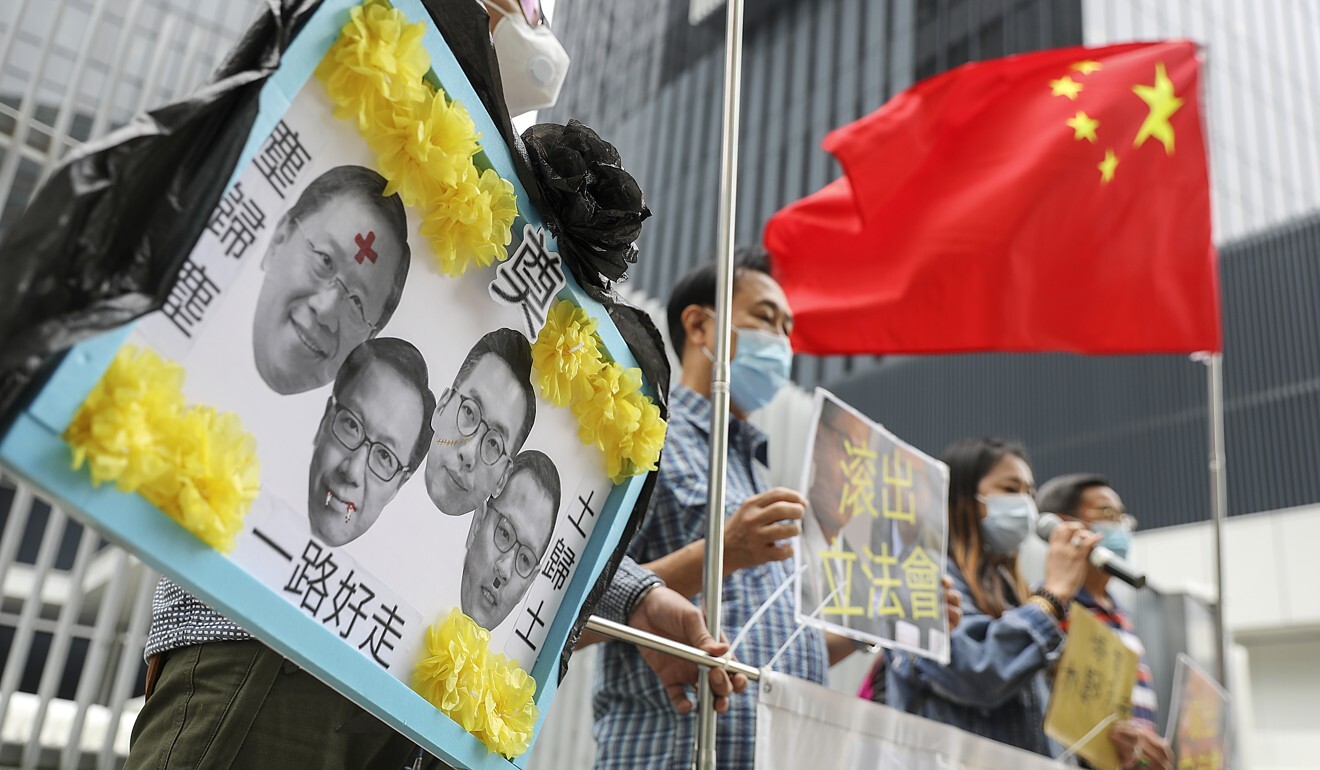
Defiant Hong Kong opposition lawmakers under fire from Beijing – and their own allies
- Beijing’s plan to unseat four pan-democrats over filibustering has put opposition legislators in a difficult position
- Online ridicule was among the reactions as all 19 pan-democrats threatened to quit the legislature
Hands joined in a show of solidarity, defiant Hong Kong opposition lawmakers on Monday threatened a mass resignation if Beijing moved to have any of them disqualified.
But as their press conference was being live-streamed, their biggest critics, ironically, appeared not to be their pro-Beijing counterparts but their own allies.
“You should have resigned from the very beginning – now you only have yourselves to blame for being played by the authorities,” one wrote on Facebook.
Another added sarcastically: “I thought you said the battle lines in the legislature were too important to be given up.”
Beijing set to make patriotism mandatory for Hong Kong legislators
Also heaping scorn on them were some young activists, who had opted for a more confrontational approach towards the authorities.
Beijing’s latest plan to unseat four pan-democrats over filibustering has put opposition lawmakers in a difficult position, exposing long-existing rifts within the bloc and raising questions over their relevance in the future.
The four facing the risk of being thrown out of the Legislative Council are the Civic Party’s Alvin Yeung Ngok-kiu, Dennis Kwok and Kwok Ka-ki, and Kenneth Leung of the Professionals Guild.

The storm first erupted in July when authorities barred the quartet from contesting September’s Legislative Council polls, which the government subsequently postponed for a year because of the coronavirus pandemic.
Despite opposition from some pro-establishment politicians, the authorities decided to allow all four to serve the one-year term extended by Beijing.
But the decision fuelled bitter infighting within the opposition bloc, with some calling for a collective boycott of an extended term they said violated democratic principles.
Nineteen pan-democrats – including the four whose political careers are at stake – eventually decided to stay put and pledged an all-out effort to block draconian bills put forward by the government, including a controversial plan to allow Hongkongers living on the mainland to vote in the city’s elections.
What would Deng Xiaoping’s ‘patriotism’ mean for Hong Kong lawmakers?
Democratic Party lawmaker Andrew Wan Siu-kin on Tuesday denied they made a wrong judgment call to stay two months ago.
“We won’t be quitting because we failed, we have succeeded,” he said, referring to the bloc’s efforts over the past month to drag out proceedings in the legislature.
Opposition lawmakers had made around 80 quorum calls in Legco meetings over the past four weeks, which forced three adjournments. They also surprised their counterparts by joining en masse – and subsequently taking control of – several subcommittees on subsidiary legislation, which could further stall the legislature’s operations.
The camp was adamant that their joint effort had prevented the controversial voting plan from being scrutinised at least in the coming months.
“The logic of those critics who mock our decision to stay is flawed,” Wan added.
Fellow Democrat Lam Cheuk-ting did not wish to comment on whether Beijing’s “divide and conquer” had succeeded.

01:14
Hong Kong opposition lawmakers threaten to resign en masse
He pointed out that around half of the camp’s supporters, according to a poll commissioned by his party, wanted them to stay in the legislature – a sentiment he said they should not ignore.
“But we believe public opinion has now changed with Beijing’s latest disqualification plan,” Lam said, adding it had significantly shrunk their room to manoeuvre in the legislature.
The 19 pan-democrats quickly reached a consensus on resigning en masse at a meeting on Monday, hours after reports emerged suggesting Beijing would move to disqualify four lawmakers in a bid to curb filibustering.
The resolution, to be endorsed by the National People’s Congress Standing Committee on Wednesday, was likely to make “patriotism” a formal requirement for lawmakers, in a move that could pave the way for disqualifying lawmakers who filibustered.
Political scientist Dr Ma Ngok, of Chinese University, said a mass resignation appeared to be an appropriate response when Beijing was determined to wipe out any filibustering in the legislature.
“Basically there is nothing else they can do in the legislature,” he said. “It is not something that could have been foreseen back in August.”
All opposition lawmakers threaten to quit as filibustering showdown looms
But Ma said there was a pressing issue awaiting the bloc – including the young activists who called for a more confrontational approach – to consider.
“What can they still do in a legislature in which they can be disqualified for making quorum calls?” Ma asked. “It is a solemn issue to be addressed.”
A source in the pan-democratic camp admitted their power would be weakened after losing their platform in the legislature but that they could only play it by ear.
A senior government official, who spoke on condition of anonymity, said many civil servants were surprised by Beijing’s move but also worried that some future policies would lose legitimacy in the eyes of the public.
“It will of course be very much easier to pass some bills with only the pro-establishment camp remaining, but I am not sure if it is a good thing. But we still have to see how things go first,” the official said.
Additional reporting by Lilian Cheng

